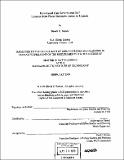How local can government go? : lessons from fiscal decentralization in Uganda
Author(s)
Barnes, Nicole C., 1972-
DownloadFull printable version (5.314Mb)
Advisor
Bishwapriya Sanyal.
Terms of use
Metadata
Show full item recordAbstract
Revenue collection in the Kibaale District in Uganda, specifically the graduated tax, has improved at the sub-county level of local government under Uganda's ambitious decentralization process. Improved collection is attributed to better enforcement, local retention of tax receipts, and smaller jurisdictions. Expenditure of these funds varies, more often than not going to administrative costs and not towards public services. Interviews with local residents indicate a unsurprising stronger preference for higher spending on public goods, but also indicates residents are not comfortable questioning local administrators' spending habits. The lack of local accountability between local officials and public preferences is problematic when residents are promised improved services if taxes are paid, and then no progress on delivery is evident. However, accountability between the sub-county officials and district supervisors is quite developed, insofar as it relates to revenue collection and general administrative checks and balances. One recommendation is for increased supervision of sub-county officials, especially in terms of expenditures. This would be enhanced by expenditure standards, broad cost guidelines for routine administrative expenses, and more defined responsibilities of service provision of the district vis-a-vis the sub-county. More qualitative evaluation, as opposed to restrictive censorship, can be beneficial for local governments so long as it does not stifle local administrators' opportunities to be innovative. A second recommendation is that village retention of funds be shifted to the higher authority of the sub-county, so that scarce resources can be more efficiently applied to visible public goods. As 25% of all sub-county funds are currently remitted to the village, this in effect divides these monies up into such small amounts that they cannot be applied to significant projects for the benefit of village residents. If kept at the sub-county, these funds should be earmarked for villages so sub-county administrators can target groups of villages in a given fiscal year and rotate the funds' use on a yearly basis.
Description
Thesis (M.C.P.)--Massachusetts Institute of Technology, Dept. of Urban Studies and Planning, 1999. Includes bibliographical references (p. 38-40).
Date issued
1999Department
Massachusetts Institute of Technology. Department of Urban Studies and PlanningPublisher
Massachusetts Institute of Technology
Keywords
Urban Studies and Planning